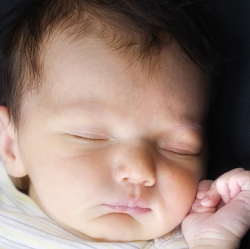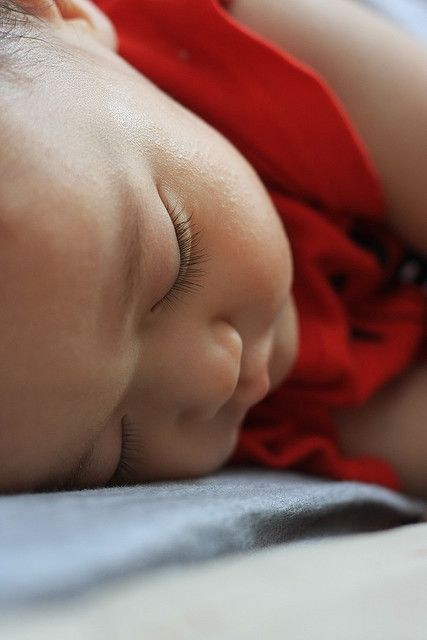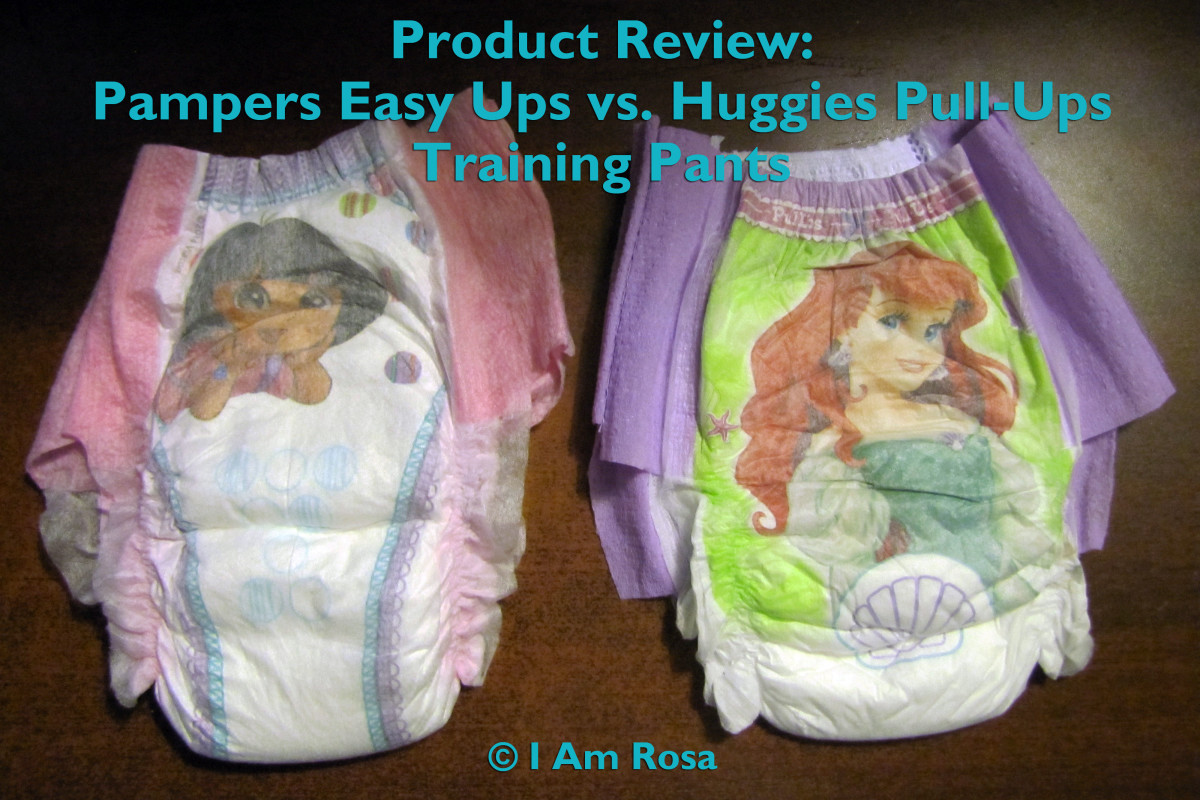How To Help Your Baby Get Great Sleep

Healthier Sleep Habits = Happier Child. Definitely an equation that worked in my house
Sleeping like a baby. Ha! Before I was a parent, I never knew how ironic that saying was. While many newborns sleep a lot, it's in fits and starts. A few friends had babies who slept most of the night at only a few weeks or months old, but I was not one of those extremely fortunate people. If you're here to learn about healthy sleep habits, I'm guessing that you're not one of those lucky parents either.
While there's a lot of sleep advice flying around out there, and a number of schools of thought on how to help babies (and older children) sleep better, the one I found most helpful seemed to be the most researched one as well. Healthy Sleep Habits, Happy Child was a book that made my life as a new parent (and my daughter's life as a young baby) a lot easier. While some people think that Healthy Sleep Habits, Happy Child is all about making your baby 'cry it out', it's actually more about paying attention to your baby and her tiredness cues and teaching her how to self-soothe in ways that don't eliminate crying, but keep it to a minimum.
I really appreciated how practical this book is, and I hope that you and your family benefit from it as well.
Photo credit: http://www.flickr.com/photos/jm_photos/1800772115/

Wanting to Help Your Child Fall Asleep With Their Natural Sleep Cycle?
For me, reading a book written by a pediatric sleep expert was extremely helpful.
The resource that I've found to be the most helpful by far in this endeavor has been the book Healthy Sleep Habits, Happy Child by Dr. Marc Weissbluth, an American pediatrician affiliated with the Children's Memorial Hospital in Chicago, has been practicing for more than 30 years. His extensive research on sleep disorders in children has revealed that daytime sleep is as important as nighttime sleep for young infants and toddlers. As a mom trying to help my baby start off her sleep rhythms in a healthy way, it was extremely valuable to me to have a pediatric sleep expert address lots of common sleep problems and teach parents how to help their children form good sleep habits within the framework of their child's natural sleep cycles.
photo credit: http://www.flickr.com/photos/abbybatchelder/4099108126/
What Does This Book Cover? - Here's a preview of what you'll find in Healthy Sleep Habits, Happy Child. I've condensed it into some of the big topics.
- Why Healthy Sleep is So Important/What is Healthy Sleep? -- I really appreciated Dr. Weissbluth's expertise as a pediatric sleep expert in telling me why I should care so much about my child's sleep and how poor sleep can adversely affect children.
- Sleep Strategies -- The book explores different strategies for helping children get good sleep, and weighs pros and cons of each method. It also explains how you can help prevent sleep problems, and gives practical advice for preventing problems.
It covers topics such as naps, nighttime sleep, when to start sleep training, and how to help your child fall asleep naturally.
- Sleep Problems and How to Overcome Them -- If your child has a specific sleep problem like not napping when they need a nap, waking up waaaaaay to early (like my daughter), difficulty staying asleep, or not staying in their bed (or many, many more non-ideal sleep situations), this section is for you. It's a go-to resource to help get your child back into a better sleep rhythm.
- Age-Specific Chapters for Healthy Sleep -- It's wonderful to be able to go to a chapter that addresses your child's sleep needs for different ages. Dr. Weissbluth outlines different sleep needs that each age has and goes through common issues that arise at each stage of development. While most people use this book to help with babies' and toddlers' sleep, he also has chapters about preschoolers, school age and adolescent children.
- Special Concerns and Situations -- Help with everything from sleepwalking, changing sleep routines for daylight savings time, bedwetting, frequent illnesses, adjusting to a new sibling and many more.
"I love Dr. Weissbluth's philosophy that the most important thing is to have a well-rested family. And fortunately, thanks to this book, most days (and nights) we do!"
-- from the Healthy Sleep Habits, Happy Child foreword by
Cindy Crawford

How does this work in real life?
How Healthy Sleep Habits, Happy Child helped my baby and I
As a first-time mom with a newborn, I had no idea what was good for my daughter's sleep. All I knew was that she slept on and off during the day and it took us seemingly forever to get her to fall asleep at night. The process of getting her to fall asleep was a long session of rocking, swaddling and shushing that wore us both out. I was getting severely sleep-deprived, and started looking for resources to help. A good friend recommended Healthy Sleep Habits, Happy Child (HSHHC) and I was thrilled to see there was a 'how to use this book' section at the beginning that pointed a half-awake mommy in the right direction.
HSHHC guided me in putting my good intentions for my child's well-being into practice, and has been my main resource for sleep training. One key concept to internalize, though, for this and any other child sleep book is to remember that you and your child are not a book; you're real people for whom not everything may be the best fit. You know your child, so carefully determine where there are places that would be more beneficial to deviate from 'the program.' In my case, my wise pediatrician offered some other suggestions that were key in molding my sleep training process even more specifically to my daughter's very alert and determined personality.
Like Dr. Weissbluth suggests, I started paying attention to my baby's 'drowsy signals' and started soothing her to sleep at appropriate times where she'd be most likely to fall asleep easily. At three months old, I put her down in her crib drowsy but awake for about ten minutes or so. If she didn't fall asleep or was really upset, I picked her up and soothed her all the way to sleep. By the time she was 5 months old, my daughter would fall asleep in her crib on her own the vast majority of the time. She usually played or cooed for a little while then drifted off to her naps or bedtime.
While some children start sleeping through the night on their own, my baby did not. At 8 months old, she was still waking up once or twice a night to nurse, sleeping for 6 hours in a row maximum. (for the sake of this story, 'sleeping through the night' will mean sleeping at least 10 hours in a row.) After careful consideration, my husband and I decided to try the method Dr. Weissbluth describes as 'extinction,' the one that has some of the least amount of crying overall. When my daughter woke up in the middle of the night, we let her cry, and she finally put herself back to sleep. It was so hard to listen to her in there, but the next night she just fussed for a short time before going back to sleep. The third night, she slept through the night. After that, she consistently woke up happy and fell asleep on her own with little to no fussing at all.
At first I thought that putting my child down for bed later would equal her sleeping later, but as HSHHC mentions, this really is not the case. Earlier bedtimes usually equal more sleep, and that proved itself in our experience. In protecting our baby's early bedtime of 7:15PM, I ran into a lot of people who asked why we didn't take her out to more evening activities, commenting that keeping her up will just make her sleep later. We tried that, and all we got was a crabby, tired child the next day. In talking with other parents, I've found more and more of them have the same experience as we've had, and understand why we protected our baby's early bedtime for the vast majority of nights.
Sometimes my daughter woke up really early, and when that happened for several mornings in a row, we've found the suggestions from HSHHC very helpful....not going in to get our baby before 6AM, and trying a slightly earlier bedtime for the next few nights. It took patience to help get her sleeping in longer, but it was worth it.
Get Healthy Sleep Habits - Whether you have one child, a child who is extra fussy or you have twins, Dr. Weissbluth has resources to help you and your child(ren

Book Review of Healthy Sleep Habits, Happy Child
My take on the book as a whole
Dr. Weissbluth is logical and thorough with his research as well as in how he explains his conclusions and advice in a caring, understanding manner akin to a trusted mentor. While some of the data and explanations were long, I was able to get the big picture fairly easily and felt comforted that the ideas Weissbluth was communicating were grounded in reality, not just his opinion. Is there another child sleep solutions book out there with research backing it up like this one does?
The book was well-organized and it was easy to find the most pertinent topics that applied to my child's temperament, age and our family's situation. I really appreciated Weissbluth's focus on learning about your child as an individual to help guide him/her to healthy sleep pattern. Additionally, understanding childrens' biological sleep rhythms helped me see that while each child is unique, there are some very common patterns that appear in children with healthy sleep habits.
I thought that Dr. Weissbluth provided an expert's assessment of different views of 'no cry', 'maybe cry', and 'let cry', including his observations from helping hundreds of families with their childrens' sleep problems. While he definitely has an opinion on the effectiveness of each particular method, in reading this section of the book I didn't feel like Weissbluth was judging anyone for the style of training that they deemed the best fit for their situation.
Interspersed in the chapters were practical points, reminders, and other helpful advice to help you apply principles to your family's situation. Another valuable feature was the stories from real families about their situations and how the helped their children develop healthy sleep habits with Dr. Weissbluth's guidance. Even if the sleep issue a particular family was dealing with was completely unrelated to my experiences, it still made me feel like I wasn't alone and I was empowered to help my child. The kicker: the 'Action Plans for Exhausted Parents'...how's that for getting right to the point and showing you how to move Weissbluth's ideas from the page to real life.
photo credit: http://www.flickr.com/photos/chmeredith/3127325654/
Some of the Helpful Principles from the Healthy Sleep Habits Book
Many people wrongly equate sleep training with 'cry it out'. Instead, Dr. Weissbluth teaches parents about learning your child's natural tendencies and guiding your child in forming even healthier sleep habits. Here's what I found most helpful from the book:
- If you start early with sleep training, you will be well along the path to preventing sleep problems. By early, I don't mean sleep-training a newborn. We waited until our daughter was around 4 months old.
- Respect a young baby's one to two-hour windows of wakefulness during the day. Don't push them to stay awake much longer.
- Watching your child for signs of sleepiness and starting to soothe to sleep before the end of her wakeful period. Watch your child more than your watch.
- Developing a consistent, calming bedtime routine. For us, it was a soothing bath for our daughter, a short book, then a lullaby.
- Respect your child's need to sleep. Try to be home during your child's usual naptimes to enable your child to have their nap on a regular basis. I let my daughter nap in the car sometimes, but I didn't make a habit of it. Having her associate her bed with sleep was helpful and then she didn't depend on motion to help her fall asleep.
- Keeping a sleep log (a general record of when your child is awake or asleep) is a tool help you spot patterns and trends in your child's sleeping if you think there may be a need for a change. It helps you schedule your day better too. :)
- Bedtimes between 6PM and 8PM tend to be the help children not develop sleep problems in the first place. It seems to me that there's lots of societal pressure for kids to have later bedtimes, but it's so much more helpful for your child to go to bed on the earlier end of things.
- You are guiding your child in an age-appropriate nap and bedtime schedule. As you are helping them develop this, your child initially may not cooperate by falling asleep immediately. Don't give up. My advice: go for progress, not perfection. Adults don't fall asleep immediately all the time either.
- Getting up too early may be caused by going to sleep too late. Early bedtimes often prolong night sleep and prevent early wake-ups. I've had so many people tell me to keep my daughter up later so she'll sleep later. It's never worked. Every time I try it, she wakes up at the same time or earlier.
- Sleep begets sleep. This is a true statement. Even though it's not logical, it's biological. I liked this quote, and it's pretty true.
The Goal: Great Sleep for Baby - ...and you!

photo credit: photo credit: http://www.flickr.com/photos/iandeth/3155629157/
Healthy Sleep Habits VS. No Cry Sleep Solution - Tell which methods of sleep training have worked the best for your children, or which one you think is the most
NOTE: This is meant to be a robust yet friendly discussion. Please be considerate, mature and non-inflammatory with your comments; whichever side they fall on. If they aren't, they will not be posted. Thanks!
Whose helping babies sleep method do you most agree with? Dr. Weissbluth (Healthy Sleep Habits, Happy Child) or Elizabeth Pantley (The No-Cry Sleep Solution)
More about Healthy Sleep Habits - A real-world mom's guide to helping your child sleep well, book reviews, and more background on Dr. Weissbluth
- Blogger 'Unsolicited Advice''s Getting Through Sleep Problems Guide
An incredibly realistic account of a mom's helping her child get through some common sleep issues and helping develop good sleep habits. She bases a lot of what she does on 'Healthy Sleep Habits, Happy Child', and customizes it to her family. I love - Healthy Sleep Habits, Happy Child book review on Blisstree.com
Review from one of the bloggers on Blisstree.com, a lifestyle site which "provides candid, honest and interesting perspectives and encourages a community for women for all ages." - Healthy Sleep Habits, Happy Child book review on TheMomCrowd.com
The articles on The Mom Crowd are written from a "this worked for me" point of view. - Summary on iVillage
A short article containing the Dr. Weissbluth's philosophy, what you have to do, what you might like about the technique, drawbacks, and further reading







